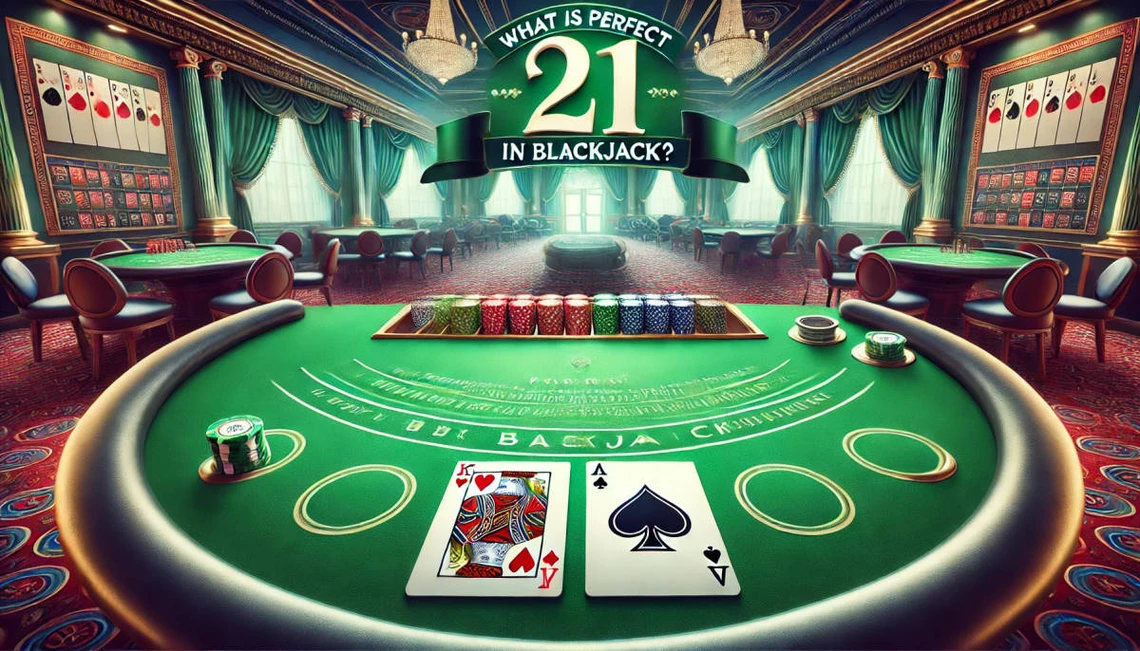
What Is a Perfect 21 in Blackjack?

Blackjack is one of the most popular casino games, and achieving a "perfect 21" is the pinnacle of excitement for players. This article explores what makes a perfect 21 special, its significance in the game, how it works, and even the odds of getting one.
Understanding the Perfect 21
A perfect 21, commonly called blackjack, is a two-card hand in blackjack where the total value equals 21. It is composed of:
- An Ace (valued at 11 in this scenario), and
- A 10-value card (10, Jack, Queen, or King).
This combination represents the strongest possible hand in blackjack, resulting in an automatic win unless the dealer also has a blackjack, in which case it’s a tie (push).
Perfect 21 vs. Perfect Pairs
It’s important to distinguish a perfect 21 from the Perfect Pairs side bet, which is a completely different aspect of the game:
- A perfect 21 refers to a natural blackjack, where the total is exactly 21 from the first two cards.
- The Perfect Pairs side bet involves wagering on being dealt two identical cards (e.g., two Kings of Hearts).
While both can be thrilling, they serve entirely different purposes and appeal to different strategies.
How Does a Perfect 21 Affect the Game?
A perfect 21 has a significant impact on the game due to its unique position as the best possible hand:
- Immediate Win: If you achieve a blackjack, you automatically win the round unless the dealer also has a blackjack. In such cases, the result is a push, and your bet is returned.
- Impact on the Dealer: When a player achieves a perfect 21, it eliminates the dealer’s opportunity to play out their hand. This puts the dealer at an inherent disadvantage, as they have no chance to recover or improve their position against the player’s unbeatable hand.
This hand’s ability to instantly resolve the round in your favor adds to its allure and excitement.
What Are the Odds of Getting a Perfect 21?
The probability of being dealt a perfect 21 depends on several factors, such as the number of decks in play. Here are some key points:
- In a single-deck game, the chance of getting a blackjack is approximately 4.83%. This means you’ll get a perfect 21 about once every 21 hands, on average.
- In multi-deck games, the probability decreases slightly due to the distribution of cards across more decks.
Other factors, such as the rules regarding dealer hits and blackjack payouts, can also influence the overall value and frequency of a perfect 21 in gameplay.
Payouts for a Perfect 21
One of the most rewarding aspects of achieving a perfect 21 is its payout. Here’s how it typically works:
- Standard Payout: Most tables offer a 3:2 payout, meaning for every $10 wagered, you win $15.
- Reduced Payout: Some tables may offer a 6:5 payout, where a $10 bet wins only $12. This rule variation minimizes the value of a blackjack and increases the house edge.
Understanding the payout structure before sitting at a table is crucial, as it significantly impacts your potential winnings.
Conclusion
A perfect 21 is the ultimate goal in blackjack, symbolizing both luck and skill. Understanding how a perfect 21 works, its odds, and its significance in the game can enhance your enjoyment and strategy at the blackjack table. Whether you’re a seasoned player or a beginner, the thrill of achieving a perfect 21 is unmatched.

Author
Gambling Consultant